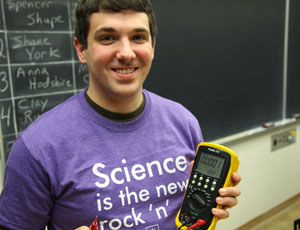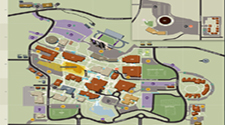Student Research Opportunities in Physics
In the WSU Physics Department we encourage all students to get involved in research projects and other independent work. These projects give you an opportunity to work more independently than in a traditional classroom setting, choosing a project to suit your personal interests. They also give you a taste of what scientific research is like, perhaps helping you decide whether to pursue a research-oriented career.
Because we offer no graduate programs, undergraduate physics students have access to all of our department’s research equipment. Mentoring undergraduates is a priority of our faculty.
When should you do research?
It’s never too early to start planning a physics research project! Browse the list of opportunities below, and get to know the faculty who work in subfields of physics that interest you. Depending on the project, you may be able to participate even before you have taken a course in physics. In other cases, our faculty can advise you on how to prepare for an early start in physics research.
Getting credit
Many students doing physics research projects obtain academic credit, by signing up for PHYS 2800 (lower division) or 4800 (upper division). Students doing independent guided reading projects can obtain credit through PHYS 2830 or 4830. For projects in astronomy, students can obtain credit through ASTR 2800, 2830, 4800, or 4830. All students majoring in Applied Physics must sign up for at least one PHYS 4800 course. Some students ultimately develop their research projects into a Senior Thesis (PHYS 4970). Approval of a faculty mentor is required before signing up for any of these courses.
Getting paid
In some cases, students may obtain a research stipend or scholarship as an alternative to academic credit. Funding comes from a variety of grants and fellowship programs, and may be available for part-time research at any time, or for full-time research during the summer.
Summer research elsewhere
We also encourage WSU physics students to consider summer research internships at other institutions. These internships are typically competitive, but our faculty can advise you on how to put together a strong application. The largest collection of summer research opportunities is the National Science Foundation’s Research Experiences for Undergraduates (REU) program, with more than 100 sites nationwide, mostly at universities, offering opportunities in physics, astronomy, and related fields.
Seminar in Physics
The Seminar in Physics course (PHYS 4990) provides an opportunity for students to present the results of research projects to their peers, and to hear about physics research both at WSU and elsewhere. Physics seminars are open to the entire WSU community, and all physics students are encouraged to attend. Each student majoring in Physics, Applied Physics, or Physics Teaching must register for PHYS 4990 at least once.
Current physics research programs at WSU, and the faculty members associated with each.
Exoplanet and Planetary Science
I work with the Virtual Planetary Laboratory to help characterize planets around other stars. If you like working with computers, we use simulations to predict conditions on other worlds, helping the engineers optimize instrumentation for NASA's next-generation telescopes. I also analyze data from several Mars missions to explore the history of the Martian climate. If you are interested in detecting and characterizing Earth-like planets or exploring ancient Martian landscapes, this research may be for you.
HARBOR (High Altitude Reconnaissance Balloon for Outreach and Research)
Want to send something you helped make to the edge of space? Want to help understand how our atmosphere works and how pollution is formed and transported? The HARBOR program researches air, flight, sensor physics, and atmospheric dynamics. We use all aspects of physics from thermodynamics to optics to mechanics to electronics and apply that to figuring out how to measure the world around us, especially air. HARBOR participants have had excellent success in getting future employment and/or acceptance into graduate school. It doesn't matter what level of experience you have, there are HARBOR projects for students of all abilities. The only requirement is that you are motivated to work hard and learn.
Medical Physics
Sometimes we want to know the composition of an object without destroying it. At WSU we use x-ray fluorescence (XRF) to measure the amount of gold, silver, tin, copper or lead within an object. Our system is optimized for the measurement of lead, and students have measured the lead level of jewelry, pottery, faculty coffee mugs, eagles, and most important, bone lead levels for people living in Utah. In addition to experimental research in the lab, students have done reading projects in all areas of medical physics: medical imaging, cancer treatment, nuclear physics, ocean physics, and more!
Observational Astronomy
Need more space? Observational astronomers take data from the sky and use it to validate or invalidate physical ideas about how the universe works. As our facilities here at Weber State improve, student projects will grow to include searching for supernovae, studying the rotation of asteroids, monitoring variable stars of all kinds, detecting or verifying planets around other stars, and more ... projects begin simply by learning to understand and characterize "observations”, and then move on to more detailed physical modeling of the data. Students at all levels are welcome to come and discuss project ideas with Dr. Palen!
Science Education Research
How do we learn scientific ideas and the processes of scientific work? In what ways do we become confused or even get the wrong ideas—and do those “wrong” ideas ever help us in eventually learning the right ones? This research uses questionnaires, interviews, and other methods to help us understand how learners at different levels change their thinking as a result of different experiences and perspectives. Students involved in this research could take on any of a number of different tasks, ranging from independent readings to conducting interviews to classroom observations to data analysis and coding.
Semiconducting Materials Development
Are you interested in the world invisible to the eye? Would you like to understand how the materials we rely on work and how we can make new and better ones? Do you think electronics are cool and want to better understand what makes them viable? If so, you should come talk with us about possible research opportunities in materials science. In our group, we study the materials around us and their unique properties. Specifically, we can focus on very thin materials for electronics. We can make our own thin film materials with our sputtering system or measure the properties of materials from other researchers and industry partners. Several topics currently being explored are: materials for solar cells, materials for dyes in the cosmetology industry, and materials for heat generation.
Theoretical Physics
You don’t have to be a genius to do theoretical physics—but you do have to be genuinely curious about the universe, have time to think and calculate, and care about the quality of your work. Past student theoretical projects have been in quantum physics, statistical physics, elementary particle physics, relativity, and astrophysics. Most of these projects have involved computational work, and some have included the development of web applications for public outreach.
Astroparticle Physics
Dr. Jonathan Cornell
Dr. Cornell’s research focuses on new theories of particle physics and what a range of experimental probes, both in the sky and on the ground, might tell us about those theories. He is particularly interested in the nature of dark matter and makes extensive use of high-performance computing in his work.
Office hours
Monday - Thursday
8:30 a.m. - 4:30 p.m.
Mailing address
Weber State University
Department of Physics
1415 Edvalson St., Dept. 2508
Ogden, UT 84408-2508

